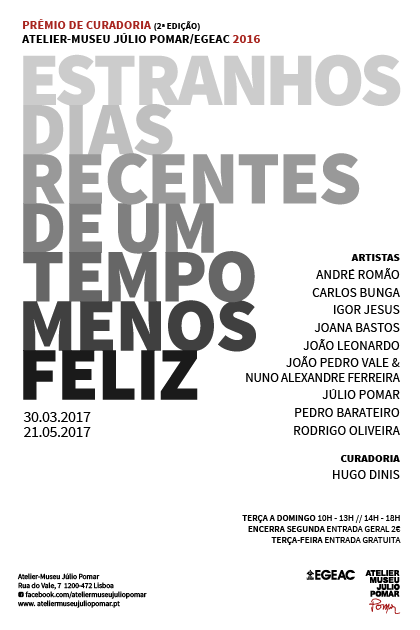
On 30 March at 6pm, the Atelier-Museu Júlio Pomar inaugurates the curatorial project which won the second edition of the Atelier-Museu Júlio Pomar/EGEAC Prize in 2016, ‘Strange recent days in less than happy times’, curated by Hugo Dinis, which will include the artwork ‘O Almoço do Trolha’ [The Bricklayer’s Lunch] by Júlio Pomar, among other works by artists André Romão, Carlos Bunga, Igor Jesus, Joana Bastos, João Leonardo, João Pedro Vale & Nuno Alexandre Ferreira, Pedro Barateiro and Rodrigo Oliveira.
Ideas of crisis and austerity with respect to the socio-economic situation of the Portuguese Republic within the European Union have become widespread in recent times within politics and the media. Current data points to an increase in poverty, while the loss of purchasing power of the middle class – the engine of the economy, as far as society is constituted – is deemed to be of less significance It should also be noted that the economic elites do not seem to have suffered a similar fall in their levels of consumption.
Would it be decent and compassionate to state that contemporary history was equally difficult for everyone? Or would it be preferable to avoid acknowledging that sacrifice and hardship are always (or almost always) borne by the voiceless population, who remain trapped on the margins of society?
In this way economic, social and cultural imbalances are accentuated and, without empathy, deepen the divide between all, ensuring that despair and struggle are the concepts that come to dominate the channels (of communication) that separate them. In any case, no attempt will be made here to apportion blame for the recent past nor to predict the future, but rather to explore the emotions, reactions and reflections present in the contemporary world.
From this perspective, the works presented in the exhibition ‘Estranhos dias recentes de um tempo menos feliz’ [Strange recent days in less happy times] all share similar themes and concerns: nostalgia for what is lost, decadence and precariousness. – Text by Hugo Dinis.
By offering multiple perspectives on this catastrophe, the artworks reveal the impossibility of salvation: André Romão, ‘O Inverno do nosso descontentamento’ (2010) and ‘Para um Teatro Pobre’ (2010); Carlos Bunga, ‘Sem título (modelo)’ (2007); Igor Jesus, ‘POV’ (2015); Joana Bastos, ‘Next money income’ (2007); João Leonardo, ‘Untitled (Table)’ (2010/11); João Pedro Vale, ‘Heróis do Mar’ (2004) and ‘Coragem Portugueses, só vos falta serem Grandes’ (2010); João Pedro Vale & Nuno Alexandre Ferreira ‘I Can Hold It, I’m Portuguese! #2” (2017); Júlio Pomar, ‘Almoço do Trolha’ (1946/50) and ‘Subúrbio I’ (1948); Pedro Barateiro ‘The Current Situation’ (2015); e Rodrigo Oliveira, ‘Mau tempo no canal’ (2004).
To mark the exhibition, a catalogue/book will be published containing texts by Sara Antónia Matos, director of the AMJP, Hugo Dinis, the exhibition curator, and Alexandre Quintanilha, Carmo Sousa Lima, José Neves, Miguel Vale de Almeida and Tiago Castela.
Hugo Dinis (Lisbon, 1977) lives and works in Lisbon. He graduated in Painting from the Faculty of Fine Arts at the University of Lisbon and obtained a postgraduate degree in Curatorial Studies in collaboration with the Gulbenkian Foundation, Lisbon. He curated ‘Eu (título em construção)’ [I (Title under Constuction)] (2015) at the Espaço Novo Banco, Lisbon; ‘A Iminência da Queda’ [The Imminence of the Fall] (2009) at the Galeria Diário de Notícias, Lisbon; and ‘Desedificar o homem’[Deconstructing Man] (2008) at the Galeria Municipal Paços do Concelho, Dois Paços Galeria Municipal and Transforma in Torres Vedras as part of the travelling project ‘Antena’ by the Serralves Foundation.
For more information on the 2nd Edition of the Atelier-Museu Júlio Pomar – EGEAC Prize click here.